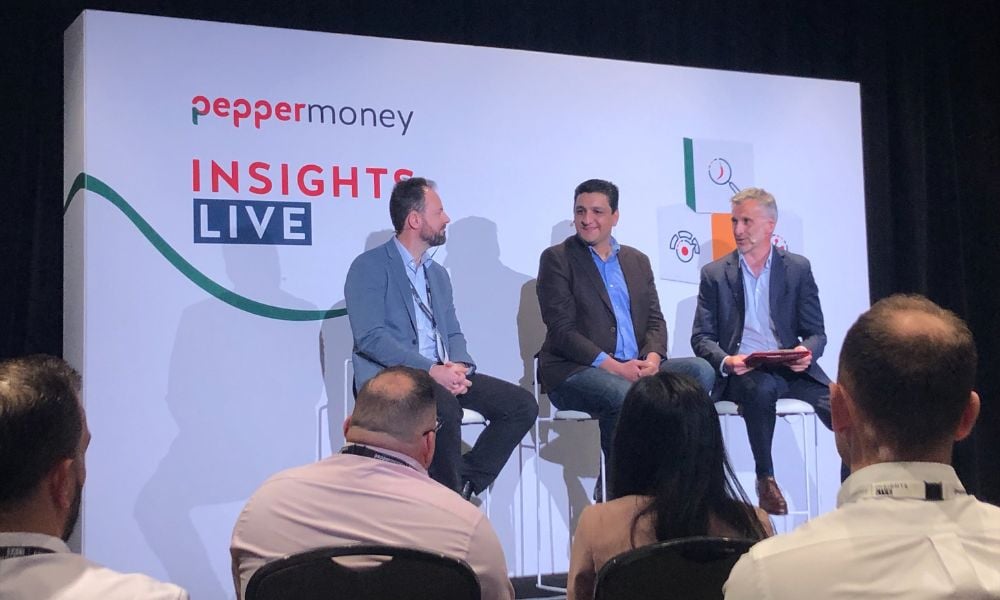Experts discuss EVs, AI at Pepper Money event

Business needs around asset finance are undergoing rapid change, giving brokers the opportunity to develop a competitive advantage as uptake of electric vehicles and adoption of artificial intelligence grows.
Pepper Money held its eighth annual Insights Live event on Wednesday at Rosehill Gardens Racecourse in Western Sydney, attracting over 1,000 brokers and asset finance introducers who attended in person and virtually. Themed “Cutting through the Noise”, 13 speakers shared tools and insights to help brokers navigate the ever-changing lending landscape amid rapid advancements in technology.
In an event first, Pepper Money World provided an interactive exhibition space where brokers were able to conduct business, interact with their peers, explore partner stands, listen to mini TED-style talks and view the latest electric vehicle from fast-growing electric vehicle (EV) brand BYD.
Titled “Shifting gears – adapting to accelerate growth”, the asset finance panel discussion was held in the afternoon, facilitated by Pepper Money head of sales, asset finance Michael McEvoy (pictured above right).
Electric Vehicle Council CEO Behyad Jafari (pictured above centre) and Microsoft Australia senior director specialist solutions Adrian White (pictured above left) were panellists in the discussion.
The asset finance session focused on opportunities around technology, consumer behaviour and different asset classes, to help brokers ride the wave of change and create a competitive advantage.
Supply of EVs in Australia expected to grow
Although the range of electric vehicles is more limited in Australia than in places such as Europe, Jafari said that the number of EV models was just under double that of a year ago.
“Announcements for what is coming throughout the end of this year and the beginning of next year [indicate that] we’ll see something like a 1.5% increase in the number of models again,” Jafari said.
Tesla sales accounted for around 50% to 60% of growth over the last 12 months, attributable to its accessibility online, he said.
For the range of EV models to grow, Jafari said manufacturers would need to gradually increase production to meet demand. Many had experienced a rapid sellout of their initial allocations and would be looking to increase supply incrementally.
“All of these companies have wait lists and they are finding that everyone else (whether it is people who provide charging infrastructure, finance or insurance), that as they see that excitement and start developing particular products, they’re finding their own pipelines are starting to massively grow,” Jafari said.
Feedback received by the Electric Vehicle Council indicated that EV customers were increasingly looking for products to support their purchase, and if they weren’t available through the manufacturer, they would source them elsewhere.
If fuel efficiency standards are mandated in Australia as they are elsewhere in the world, Electric Vehicle Council projections after 2030 indicate that upwards of 50% to 60% of new vehicles sold will be zero emissions.
While EVs cost more upfront, the longer they are utilised in fleet purchases, the higher the opportunity for EV owners to recoup their outlay and start saving, Jafari said.
Questioned about common myths around EVs, Jafari said they are generally related to perception issues, such as how long an EV takes to recharge. Consumers are likely to adapt their behaviour to the requirements of owning EVs in much the same way they adapted to using email and mobile phones, he said.
“You don’t wait for that petrol light to come on and then go somewhere – you get to your carpark at work and you might still have 30%, 40% left and you plug in anyway because that gets you up to 80% or 90% and you’ll be OK for another week,” Jafari said.
Jafaris said that a five-year warranty was standard among EV dealers, and that the warranty on the battery was extended to eight years. This was in line with feedback received by the Electric Vehicle Council on the minimum period in which EV batteries last, he said.
“Batteries do degrade but we’re talking about a level of 1% every two years so at the end of one or 15 years they’re still a very usable battery that has 300km to 400km in range,” he said
FBT exemption provides opportunity for brokers
The Australian government has made EVs under the luxury car tax threshold of $89,332 now exempt from fringe benefits tax, which Jafari said had contributed massively to EV sales. Feedback from leasing companies indicated sales had increased around 2.5 times (more than doubled) following the change (in force from July 1, 2022), he said.
Asset finance brokers have the opportunity to explain to clients how FBT works, which Jafari said could translate to increased business, as seen among other service providers who were able to answer questions and provide unique products.
“The lesson from FBT is that it’s been fantastic on its own, but also for industry … if you do a little bit of work, the opportunity is pretty massive for how much you can grow your pipeline in return,” Jafari said.
Entering the artificial intelligence revolution
In response to how the mortgage and finance industry could use AI to benefit their business, White said that the opportunity was around “amplifying what we already do”.
Businesses are starting to use AI in low risk situations such as back-end processes around reporting, he said. From a broker perspective, this may include looking at the velocity of the pipeline, or the health of their customer base and how often they’ve been in contact with their clients.
“Building reports around that is arduous and has been error-prone … this generative AI technology can automate a large part of that,” White said. “Look at those low-risk workloads where you can trial this out … if you’re an early adopter, you will have a competitive edge.”
As a regulated industry, he suggested that the mortgage and finance industry conduct due diligence around privacy and how data is stored.
“For example, we advise businesses not to put their business information into ChatGPT … you might be shocked at how many people inside of businesses are doing this anyway,” White said.
In response to how AI would impact the future, White said that it was likely to result in job creation and would give people performing repetitive or arduous tasks the opportunity to work on higher-order things.
“I think the shape of roles will change, new roles will be created and somehow we’re going to witness this incredible growth trajectory which may end up looking like 5% of Australia’s GDP in 2030,” White said.
Pepper Money general manager asset finance Ken Spellacy (pictured below) closed the asset finance session by presenting two shout out awards: a Game Changer Award and a Difference Maker Award.

Spellacy congratulated the two award recipients for having a vision for technology and delivering upon it, and understanding asset finance data getting to the crux of what is important for customers.
The Game Changer Award was won by LoanOptions.ai founder and CEO Julian Fayad, while the winner of the Difference Maker Awards – Individual was Ausloans Finance Group founder Rodney Michail.
What do you think is shaping demand for asset finance and is there any additional support that you would like to see from lenders? Share your thoughts in the comments section below.



